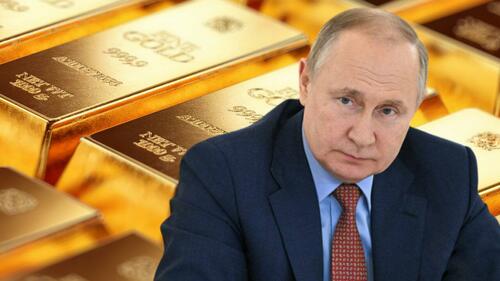US & G7 Allies Go After Russia’s Ability To Sell Its Gold As Sanctions Evasion ‘Lifeline’
G7 leaders by week’s end following Thursday’s trio of Ukraine-related summits, for which Biden was present in Brussels, agreed to launch new measures seeking to crack down on Russia’s ability to evade US and EU led financial sanctions. As a Thursday White House statement announced, “G7 and EU announce sanctions evasion initiative to prevent circumvention and backfilling of our unprecedented sanctions; continue to blunt Central Bank of the Russian Federation’s ability to deploy international reserves including gold.”
The statement additionally detailed that the US and its allies will “continue to work jointly to blunt Russia’s ability to deploy its international reserves to prop up Russia’s economy and fund Putin’s war, including by making clear that any transaction involving gold related to the Central Bank of the Russian Federation is covered by existing sanctions.”
It’s part of what Prime Minister Boris Johnson at Thursday’s G7 meeting dubbed tightening “the economic vice” around Putin, ensuring that he can’t sell the country’s gold elsewhere – and to thwart this perhaps vital final lifeline (the possible crypto lifeline notwithstanding) for the Russian economy and to prop up the rouble.
After years of building up its reserves – perhaps in anticipation for just such a showdown with the West as is happening now – Russia currently ranks fifth among countries with the largest gold stockpiles, commonly estimated at 2,300 tons, at a worth of just under $140 billion.
And on Friday, a day after Biden and his pals in Brussels discussed ways to stop Russia utilizing its gold reserves to maintain some stability in an increasingly chaotic economy, the Bank of Russia announced plans to begin buying gold from its banks at a fixed price. This could serve two purposes: 1) provide a path to liquidity for SWIFT-constrained banks, and 2) centralize more of the nation’s gold as Putin accelerates his de-dollarization plans.
It bears recalling that chairman of the Russia’s Congressional energy committee, Pavel Zavalny, said in a press conference on Thursday – as we detailed earlier – that Russia is open to accepting different currencies for its exports, beginning with natural gas, depending on the buyer’s preferred method of payment, and also “hard money” like gold. However, the chairman said terms will depend on the importing country’s foreign relations status with Russia.
“When it comes to our ‘friendly’ countries, like China or Turkey, which don’t pressure us, then we have been offering them for a while to switch payments to national currencies, like rubles and yuan,” Zavalny said during the press conference.
“With Turkey, it can be lira and rubles. So there can be a variety of currencies, and that’s a standard practice. If they want bitcoin, we will trade in bitcoin.”
Zavalny’s statement comes on the heels of President Vladimir Putin’s comments on Wednesday demanding that ‘unfriendly’ countries pay for Russian gas in rubles. Putin’s message was clear, but it is unclear whether Russia can unilaterally change existing contracts agreed upon in euros.
#G7 and the #EU are working together to stop #Russia from accessing its $132 billion worth of gold reserves to evade Western sanctions.https://t.co/hmVyyLtQbk pic.twitter.com/pJIAoPuP4y
— Forbes Middle East (@Forbes_MENA_) March 24, 2022
The State Duma’s energy committee chair echoed Putin’s decision while adding that the country should also accept gold.
“When we exchange with Western countries…they should pay in hard money,” Zavalny said.
“And hard money is gold, or they must pay in currencies which are convenient for us, and that is the national currency – ruble. That relates to our ‘unfriendly’ countries.”
Russia also being open to ‘alternatives’ like accepting bitcoin shifts the tide as Putin last year had dismissed the possibility in an interview at the Russian Energy Week event in Moscow.
Tyler Durden
Fri, 03/25/2022 – 19:20ZeroHedge News

